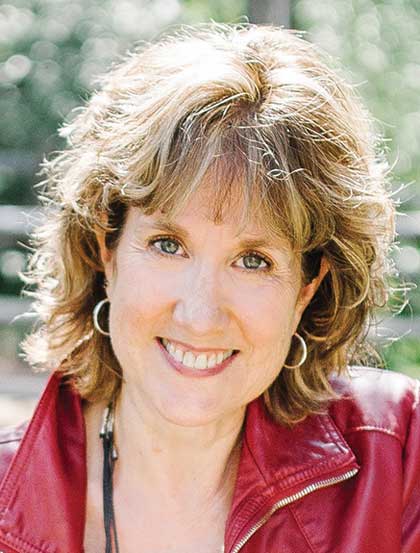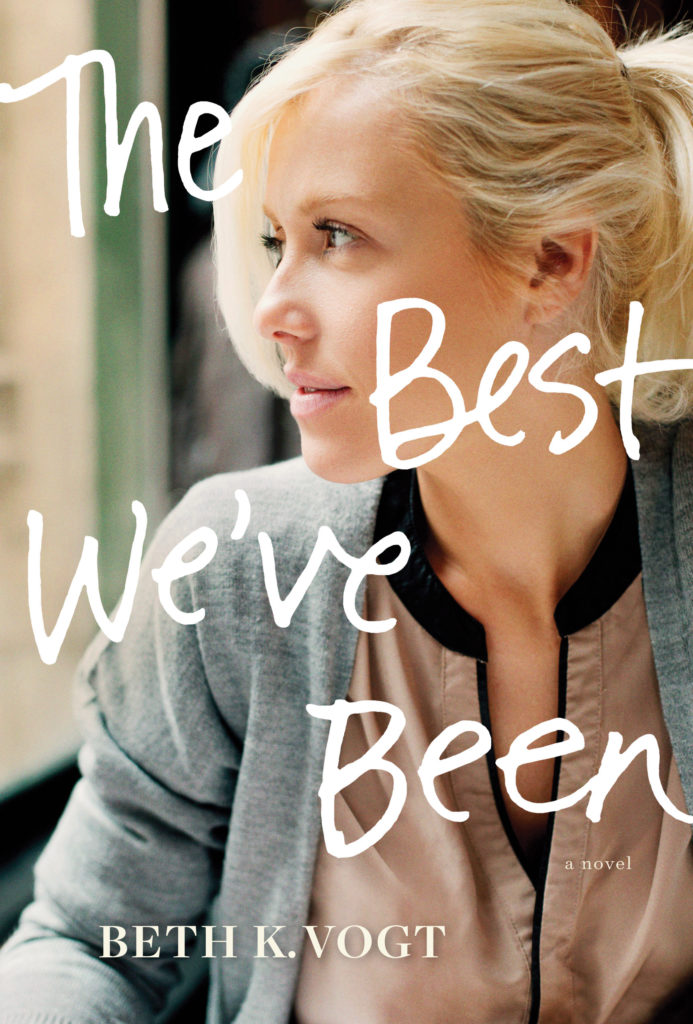Beth K. Vogt is a nonfiction author and editor who once said she’d never write fiction. The Best We’ve Been is her final book in the Thatcher Sisters series (Tyndale House Publishers), following Things I Never Told You, which won the 2019 AWSA Award for Contemporary Novel of the Year, and Moments We Forget.
She is the wife of a former Air Force family physician, now in solo practice, after having said that she would never marry a doctor or anyone in the military. She and her husband have four children. Beth also once said that she’d never have kids, and she now believes that God’s best often waits for us behind doors marked Never.
+++

As a multi-published author, it must be fun to look back on your career and think about the beginning. What prompted you, and gave you the confidence, to write that first book?
My first book was a nonfiction book titled Baby Changes Everything: Embracing and Preparing for Motherhood after 35. I’d experienced a surprise pregnancy at 41, and I couldn’t find a book that dealt with the issue from a faith-based perspective. So, I wrote one — learning a lot along the way.
Novel writing came a few years later, when God turned a season of burnout into a bend in the writing road. Like most writers, there are days I struggle with doubts. But I’ve learned the value of writing friends who help me remember why I started this writing journey and who also encourage me to lean into God’s strength as I write.
Let’s talk about The Best We’ve Been (Tyndale, May 2020). Please tell us about the story.
All of my novels begin with a Story Question — a question my characters are trying to answer and that my readers are subconsciously wrestling with, too. For The Best We’ve Been, the Story Question is: How can you choose what is right for you when your decision will break the heart of someone you love?
Johanna Thatcher is the oldest sister in the Thatcher family and her story has been unfolding slowly since book one (Things I Never Told You) and book two (Moments We Forget). Some readers might see Johanna as nothing more than a control freak, but I’ve dropped hints along the way to why she’s such a harsh person. The Thatcher sisters have struggled to trust one another for years and now Johanna is faced with a choice that could destroy the fragile truce she, Payton, and Jillian have developed in recent months.
Johanna finds herself in the middle of change, most likely something to which most of your readers can relate.
I write about real life and I want my readers to be drawn into that — some of them are probably struggling with similar questions my characters are asking, the choices they are faced with. Women will relate to how Johanna walked away from a dream. How her heart was broken by someone she loved. How she’s been misunderstood. How her life has taken a very unexpected turn — and she can’t admit that she’s scared. There’s humor in this book and there’s heartache — and I want my readers to embrace both.
What did you learn about yourself through writing this book?
As I’ve written this series, I’ve been reminded again and again that life doesn’t have to be perfect to be good. I always write books about messy relationships because, well, I understand them. I’ve lived them. And I don’t always tie things up with a nice, neat bow at the end in my books — but there’s always hope even in the midst of imperfection. There’s always the truth that God offers us more than just the mess we might see right now. We don’t have to pretend to have all the answers.
Those who “create” usually tap into a personal “toolbox” of elements to define their style. For example, a painter might use color, light, and/or shadows in a certain way to “sign” his work. A musician might use syncopation, key changes, and/or vocal intonation to set herself apart. What two or three elements most define who you are as a storyteller?
If you opened my writer’s toolbox, you’d find:
- Emotions – Lots of messy, noisy, complicated emotions. Fear. Joy. Anger. Sadness. Trust. One of my writing mentors, Susan May Warren, taught me to start each scene by figuring out the main emotion for that scene. I always anchor each scene to a specific emotion.
- Dialogue – Conversation. Lots and lots of talking. I brainstorm in dialogue and the bulk of my fast draft is characters talking. I like to say my characters are “naked, hungry, and homeless” in my rough draft.
- Prayer – All my novels have a spiritual thread. I have a specific way I weave the faith element into my stories because I don’t like to interrupt the regularly scheduled reading — I work hard to make the spiritual elements organic. Sometimes I pray, “If this imaginary person were a real person, what would they need to know about you, God?”
Your books encourage and inspire readers. What encourages and inspires you?
- Early morning quiet hours when I’m able to prayer-journal and sift through the Word for nuggets of truth that will anchor my heart and mind for the day … starting the day with solitude holds me steady.
- My Spotify playlists with favorite songs. Sometimes at the end of a hard day, I fall asleep listening to worship music and I play it all night long.
- I’m inspired by quotes — the truth spoken by others. Short soundbites that cause me to stop and think, to reframe something I’m struggling with, or refocus my perspective.
Those quotes you mention play a big part in your amazing blog! I hope my readers will check it out! What’s next for you as a writer?
I’ve been mulling over another women’s fiction project and the underlying theme is going to be pulled from my life. Something I’ve thought about tackling for years and now is the time. But it’s also deeply personal, so it may well be my most challenging novel to write.
Thank you, Beth! It’s a delight to have you back at Divine Detour.
~ ~ ~
For more information about Beth, visit her website or follow her on Facebook, Twitter, and Instagram.
To purchase The Best We’ve Been and other books by Beth, log on to:




I love this sneak peek at your thoughts behind writing women’s fiction and staying true to real life.
Thanks, Karen. When I switched to fiction, I started out writing contemporary romance. I loved that genre. Still do. But as time went on, I found my voice and realized I wanted to write women’s fiction because romance is more of the minor key in the storyline and delving into the relationships, the messiness of life, the “stuff,” was the focus.